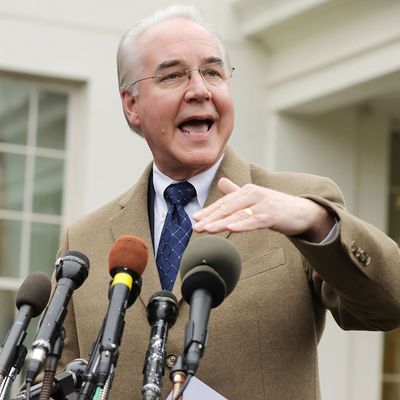
The realities of public health, much like those of climate change, bedevil American conservatism.
It does this in a few different ways. One is that the logic of markets is ill-suited to the provision of health care. Medical treatment is not an ordinary good. People don’t ever feel no need to buy new furniture one minute — then start coughing blood, and suddenly need $500,000 worth of couches to stave off death, the next. Nor is anyone born with a genetic condition that requires her to buy two iPhones a month to stay alive. But many people do find themselves in similar positions with regard to health care.
If our society were willing to let all its least fortunate, non-millionaires die of easily treatable illnesses, then perhaps our health-care system could be reconciled with Ayn Rand’s ideal of individualism. But it isn’t. Most Americans don’t want to live in a country where ambulance drivers shake down severely ill people for cash before taking them to the hospital. Nor do they want to live in a place where poor kids with diabetes are left to die from hyperglycemia.
And if you’re not willing to do that, you’re going to have to accept a little socialism. The rich and healthy are going to have to subsidize the poor and sick, whether we do this formally, through public policy, or not: When an uninsured person wracks up emergency-room bills she can’t pay, that cost gets socialized through higher prices.
The incompatibility of American conservatism and human biology is even more obvious when one considers the existence of infectious diseases. If your neighbor can’t afford Netflix and falls behind on House of Cards, that won’t threaten your child’s life. But if he can’t afford — or isn’t willing — to vaccinate his kids, that will.
American conservatives’ fondness for federalism runs into a similar problem: If the government of Pennsylvania decides that it isn’t going to require its residents to vaccinate their school children against measles, that poses a threat for people living just across the border in Maryland.
President Trump’s Health secretary does not seem to recognize this problem. In an interview with CNN Wednesday night, Tom Price was asked, “should it be required, measles, mumps, those kinds of immunizations?”
“I believe it’s a perfectly appropriate role for the government, this happens by and large at the state-government level, because they’re the ones who have the public-health responsibility … to determine whether or not immunizations are required for a community population.”
On one level, Price’s remarks can be read as a mere statement of fact. Currently, the power to mandate vaccines lies with state governments. But the federal government has the power to influence state decisions, through the policies of the Centers for Disease Control and Prevention. And, at present, the CDC recommends requiring the vaccines Price was asked about.
But when prompted to make that recommendation himself — when asked a normative question about whether such vaccines should be required — Price suggested it wasn’t his place to tell state governments how to approach questions of public health.
Granted, it’s possible Price wasn’t showing deference to conservatives’ fondness for federalism. Rather, he may have merely been deferring to his boss’s (baseless) suspicion that vaccines cause autism.






























